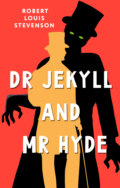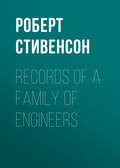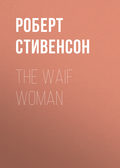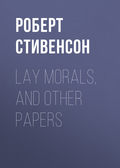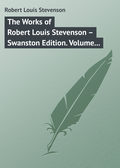полная версия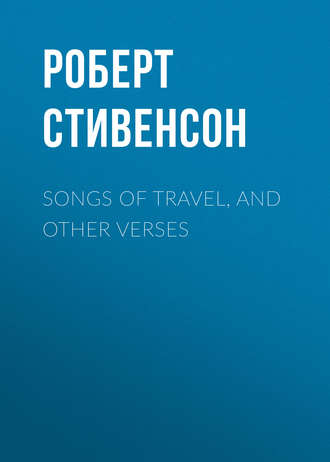

Роберт Льюис Стивенсон
Songs of Travel, and Other Verses
X
I know not how it is with you —
I love the first and last,
The whole field of the present view,
The whole flow of the past.
One tittle of the things that are,
Nor you should change nor I —
One pebble in our path – one star
In all our heaven of sky.
Our lives, and every day and hour,
One symphony appear:
One road, one garden – every flower
And every bramble dear.
XI
I will make you brooches and toys for your delight
Of bird-song at morning and star-shine at night.
I will make a palace fit for you and me
Of green days in forests and blue days at sea.
I will make my kitchen, and you shall keep your room,
Where white flows the river and bright blows the broom,
And you shall wash your linen and keep your body white
In rainfall at morning and dewfall at night.
And this shall be for music when no one else is near,
The fine song for singing, the rare song to hear!
That only I remember, that only you admire,
Of the broad road that stretches and the roadside fire.
XII – WE HAVE LOVED OF YORE
(To an air of Diabelli)
Berried brake and reedy island,
Heaven below, and only heaven above,
Through the sky’s inverted azure
Softly swam the boat that bore our love.
Bright were your eyes as the day;
Bright ran the stream,
Bright hung the sky above.
Days of April, airs of Eden,
How the glory died through golden hours,
And the shining moon arising,
How the boat drew homeward filled with flowers!
Bright were your eyes in the night:
We have lived, my love —
O, we have loved, my love.
Frost has bound our flowing river,
Snow has whitened all our island brake,
And beside the winter fagot
Joan and Darby doze and dream and wake.
Still, in the river of dreams
Swims the boat of love —
Hark! chimes the falling oar!
And again in winter evens
When on firelight dreaming fancy feeds,
In those ears of agèd lovers
Love’s own river warbles in the reeds.
Love still the past, O my love!
We have lived of yore,
O, we have loved of yore.
XIII – MATER TRIUMPHANS
Son of my woman’s body, you go, to the drum and fife,
To taste the colour of love and the other side of life —
From out of the dainty the rude, the strong from out of the frail,
Eternally through the ages from the female comes the male.
The ten fingers and toes, and the shell-like nail on each,
The eyes blind as gems and the tongue attempting speech;
Impotent hands in my bosom, and yet they shall wield the sword!
Drugged with slumber and milk, you wait the day of the Lord.
Infant bridegroom, uncrowned king, unanointed priest,
Soldier, lover, explorer, I see you nuzzle the breast.
You that grope in my bosom shall load the ladies with rings,
You, that came forth through the doors, shall burst the doors of kings.
XIV
Bright is the ring of words
When the right man rings them,
Fair the fall of songs
When the singer sings them.
Still they are carolled and said —
On wings they are carried —
After the singer is dead
And the maker buried.
Low as the singer lies
In the field of heather,
Songs of his fashion bring
The swains together.
And when the west is red
With the sunset embers,
The lover lingers and sings
And the maid remembers.
XV
In the highlands, in the country places,
Where the old plain men have rosy faces,
And the young fair maidens
Quiet eyes;
Where essential silence cheers and blesses,
And for ever in the hill-recesses
Her more lovely music
Broods and dies.
O to mount again where erst I haunted;
Where the old red hills are bird-enchanted,
And the low green meadows
Bright with sward;
And when even dies, the million-tinted,
And the night has come, and planets glinted,
Lo, the valley hollow
Lamp-bestarred!
O to dream, O to awake and wander
There, and with delight to take and render,
Through the trance of silence,
Quiet breath;
Lo! for there, among the flowers and grasses,
Only the mightier movement sounds and passes;
Only winds and rivers,
Life and death.
XVI
(To the tune of Wandering Willie)
Home no more home to me, whither must I wander?
Hunger my driver, I go where I must.
Cold blows the winter wind over hill and heather;
Thick drives the rain, and my roof is in the dust.
Loved of wise men was the shade of my roof-tree.
The true word of welcome was spoken in the door —
Dear days of old, with the faces in the firelight,
Kind folks of old, you come again no more.
Home was home then, my dear, full of kindly faces,
Home was home then, my dear, happy for the child.
Fire and the windows bright glittered on the moorland;
Song, tuneful song, built a palace in the wild.
Now, when day dawns on the brow of the moorland,
Lone stands the house, and the chimney-stone is cold.
Lone let it stand, now the friends are all departed,
The kind hearts, the true hearts, that loved the place of old.
Spring shall come, come again, calling up the moorfowl,
Spring shall bring the sun and rain, bring the bees and flowers;
Red shall the heather bloom over hill and valley,
Soft flow the stream through the even-flowing hours;
Fair the day shine as it shone on my childhood —
Fair shine the day on the house with open door;
Birds come and cry there and twitter in the chimney —
But I go for ever and come again no more.
XVII – WINTER
In rigorous hours, when down the iron lane
The redbreast looks in vain
For hips and haws,
Lo, shining flowers upon my window-pane
The silver pencil of the winter draws.
When all the snowy hill
And the bare woods are still;
When snipes are silent in the frozen bogs,
And all the garden garth is whelmed in mire,
Lo, by the hearth, the laughter of the logs —
More fair than roses, lo, the flowers of fire!
Saranac Lake.



